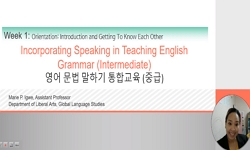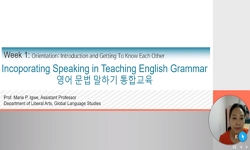Different attempts have been made to ensure educational rights of the children with disabilities from the side of Nepal Government for few decades, but such endeavors are not enough till the date. In this regard, this article presents the major barrie...
http://chineseinput.net/에서 pinyin(병음)방식으로 중국어를 변환할 수 있습니다.
변환된 중국어를 복사하여 사용하시면 됩니다.
- 中文 을 입력하시려면 zhongwen을 입력하시고 space를누르시면됩니다.
- 北京 을 입력하시려면 beijing을 입력하시고 space를 누르시면 됩니다.
https://www.riss.kr/link?id=A105063509
-
저자
정대영 (창원대학교) ; Dhruba Prasad Niure (창원대학교)
- 발행기관
- 학술지명
- 권호사항
-
발행연도
2017
-
작성언어
English
- 주제어
-
등재정보
KCI등재
-
자료형태
학술저널
- 발행기관 URL
-
수록면
1-18(18쪽)
-
KCI 피인용횟수
6
- 제공처
- 소장기관
-
0
상세조회 -
0
다운로드
부가정보
다국어 초록 (Multilingual Abstract)
Different attempts have been made to ensure educational rights of the children with disabilities from the side of Nepal Government for few decades, but such endeavors are not enough till the date. In this regard, this article presents the major barriers to inclusive education in Nepal that were found as the result of study. The data collection and analysis process of the study was guided by the qualitative research paradigm. Semi-structured interview was used to collect in-depth information from key informants (five head-teachers and 10 teachers) and related documents were also reviewed for additional information. Several factors such as ambiguity in inclusive education policy, poor collaboration between school and family, lack of knowledge about IEP, curriculum differentiation, multi-tiered support system, and transition planning; inadequate practice of co-teaching, inflexible curriculum, irresponsive instruction, poor physical infrastructure, etc. were identified as the noticeable barriers to inclusive education in Nepalese context.
참고문헌 (Reference)
1 Gunnporsdottir, H., "The teacher in an inclusive school: Exploring teachers’ construction of their meaning and knowledge relating to their concepts and understanding of inclusive education" University of Iceland, School of Education
2 Villa, R. A., "The inclusive education checklist: A self-assessment of best practices" Dude publishing, A Division of National Professional Resources, Inc 2016
3 Causton, J., "The educator’s handbook for inclusive school practices" Paul H. Brookes Publishing Co. Inc 2015
4 Nepal Law Commission, "The constitution of Nepal"
5 Singh, A. K., "Test, measurement and research methods in behavioral science" Bharati Bhawan 2006
6 Nepal Law Commission, "Special education policy, 1996"
7 Battaglino, L., "Special education around the world" 26 (26): 11-14, 2007
8 CERID, "Situation of inclusive education in Nepal" Tribhuvan University 2006
9 CERID, "Situation analysis of special needs education for the expansion of inclusive education" TU
10 Ministry of Education, "School Sector Reform Plan 2009~2015"
1 Gunnporsdottir, H., "The teacher in an inclusive school: Exploring teachers’ construction of their meaning and knowledge relating to their concepts and understanding of inclusive education" University of Iceland, School of Education
2 Villa, R. A., "The inclusive education checklist: A self-assessment of best practices" Dude publishing, A Division of National Professional Resources, Inc 2016
3 Causton, J., "The educator’s handbook for inclusive school practices" Paul H. Brookes Publishing Co. Inc 2015
4 Nepal Law Commission, "The constitution of Nepal"
5 Singh, A. K., "Test, measurement and research methods in behavioral science" Bharati Bhawan 2006
6 Nepal Law Commission, "Special education policy, 1996"
7 Battaglino, L., "Special education around the world" 26 (26): 11-14, 2007
8 CERID, "Situation of inclusive education in Nepal" Tribhuvan University 2006
9 CERID, "Situation analysis of special needs education for the expansion of inclusive education" TU
10 Ministry of Education, "School Sector Reform Plan 2009~2015"
11 Cohen, L., "Research methods in education" Routledge 2007
12 Kumar, R., "Research methodology" Dorling Kindersly Pvt. Ltd 2005
13 Best, J. W., "Research in education" Prentice Hall Inc 2007
14 Bogdan, R. C., "Qualitative research for education: An introduction to theories and methods" Pearson Education, Inc 2007
15 Patton, M. Q., "Qualitative evaluation and research method" Sage Publications 2002
16 UNESCO, "Policy guidelines on inclusion in education"
17 Ministry of Education, "Nepal education in figure: At a glance" Monitoring, Supervision, and Evaluation Division
18 Central Bureau of Statistics, "National population and housing census 2011" National Planning Commission Secretariat
19 Curriculum Development Center, "National curriculum framework for school education in Nepal"
20 Kaul, L., "Methodology of educational research" Vikas Publishing House Pvt. Ltd 2009
21 Ary, D., "Introduction to research in education" Holt Reinhart and Winston, Inc 2002
22 Brownell, M. T., "Inclusive instruction:Evidence-based practices for teaching students with disabilities" The Guilford Press 2012
23 Zelta, B., "Inclusive education: perspective on pedagogy, policy and practice" Rutledge, Tayler and Francis Group 2016
24 Artiles, A. J., "Inclusive education: Examining equity on five continents" Harvard Education Press 2011
25 Miles, S., "Inclusive education: An overview" School of Education, University of Manchester 2007
26 Corps, H, "Inclusive education. A Handicap International Publication"
27 Ministry of Education, "Inclusive education policy-2017"
28 Regmi, N. R., "Inclusive education in Nepal: from theory to practice" Ludwig-Maximilians University
29 Department of Education, "Inclusive education in Nepal"
30 Sands, D. J., "Inclusive education for 21st century" Wadsworth Thomson Learning 2000
31 Hammeken, P. A., "Inclusion, 450 strategies for success: A practical guide for all educators who teach students with disabilities" Peytral Publications, Inc 2000
32 Otukile-Mongwaketse, M. E., "Implementing inclusive education in Botswana primary school settings: an exploration of teachers’ understanding of curriculum, curriculum adaptations, and children who have learning difficulties" University of Exeter
33 Swanson, H. L., "Handbook of learning disabilities" The Guilford Press 2013
34 Human Right Watch, "Futures stolen: barriers to education for children with disabilities in Nepal"
35 UNICEF, "Examples of inclusive education Nepal" Regional Office for South Asia 2003
36 Cresswell, J. W., "Educational research: Planning, conducting, and evaluating quantitative and qualitative research" Pearson Education Inc 2009
37 Department of Education, "Educational information (Nepali Version)"
38 Kirk, S., "Educating exceptional children" Cengage Learning 2015
39 National Council for Special Education, "Children with special educational needs"
40 Kearney, A. C., "Barriers to school inclusion: an investigation into the exclusion of disable students from and within New Zealand schools" Massey University
41 Jung, D. Y., "An introduction to special needs education" Leading University Project for International Cooperation, Changwon National University 2015
42 Denzin, N. K., "A handbook of qualitative research" Sage Publications 2005
동일학술지(권/호) 다른 논문
-
장애대학생들과의 e-멘토링이 장애고등학생들의 진로결정 자기효능감 및 대학 진학 준비에 미치는 영향
- 한국특수교육학회
- 김경화
- 2017
- KCI등재
-
학년차원의 긍정적 행동지원에 참여한 교사 및 부모의 경험과 인식에 관한 질적 연구
- 한국특수교육학회
- 김예리
- 2017
- KCI등재
-
초등학교 저학년 경계선 지능 아동과 일반 아동의 보조사(은/는, 만, 도) 전제 이해 특성
- 한국특수교육학회
- 윤나네
- 2017
- KCI등재
-
통합교육 실행 매뉴얼 개발을 위한 기초연구: 초․중등학교 통합교육 현실 및 지원요구 중심으로
- 한국특수교육학회
- 이숙향
- 2017
- KCI등재
분석정보
인용정보 인용지수 설명보기
학술지 이력
| 연월일 | 이력구분 | 이력상세 | 등재구분 |
|---|---|---|---|
| 2027 | 평가예정 | 재인증평가 신청대상 (재인증) | |
| 2021-01-01 | 평가 | 등재학술지 유지 (재인증) |  |
| 2018-01-01 | 평가 | 등재학술지 유지 (등재유지) |  |
| 2015-01-01 | 평가 | 등재학술지 유지 (등재유지) |  |
| 2011-01-01 | 평가 | 등재학술지 유지 (등재유지) |  |
| 2009-01-01 | 평가 | 등재학술지 유지 (등재유지) |  |
| 2007-01-01 | 평가 | 등재학술지 유지 (등재유지) |  |
| 2006-08-09 | 학술지등록 | 한글명 : 특수교육학연구외국어명 : Korean Jounral of Special Education |  |
| 2005-01-27 | 학회명변경 | 영문명 : The Korean Society For Special Education -> The Korean Society of Special Education |  |
| 2004-01-01 | 평가 | 등재학술지 선정 (등재후보2차) |  |
| 2003-01-01 | 평가 | 등재후보 1차 PASS (등재후보1차) |  |
| 2001-07-01 | 평가 | 등재후보학술지 선정 (신규평가) |  |
학술지 인용정보
| 기준연도 | WOS-KCI 통합IF(2년) | KCIF(2년) | KCIF(3년) |
|---|---|---|---|
| 2016 | 0.99 | 0.99 | 1.18 |
| KCIF(4년) | KCIF(5년) | 중심성지수(3년) | 즉시성지수 |
| 1.23 | 1.3 | 1.503 | 0.5 |




 스콜라
스콜라






